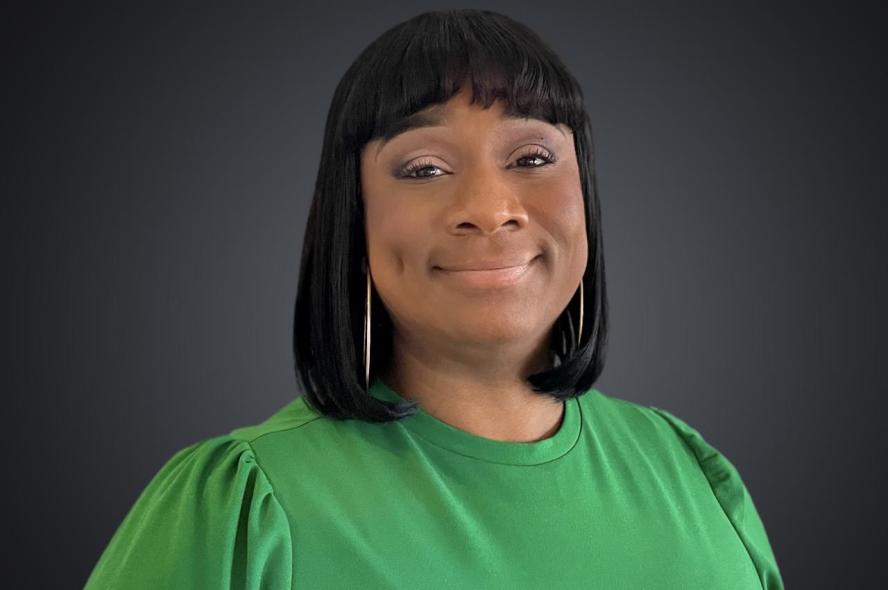-
About
- Departments & Offices
-
Academics
- Physician Assistant
- Special Master’s (MBS)
-
Admissions & Financial Aid
- Tuition & Fees
-
Student Life
-
- Student Resources by Program
- Academic & Student Support
- Wellness & Wellbeing
- Student Experience
- Events & Traditions
-
-
Research
- Research Labs & Centers
-
Local & Global Engagement
- Global Health Programs
- Community Engagement
Pointing Out the Blind Spots in Health Care, Infectious Disease
The COVID-19 pandemic helped Ph.D. student Adrianne Gladden-Young discover her voice. Now, she’s using it to reduce racial health disparities and create pathways for scientists from underrepresented groups

At just 6 years old, Adrianne Gladden-Young, A04, lost her favorite neighbor to complications from AIDS—her first experience seeing how infectious diseases disproportionately impact the Black community.
Inspired by the tragedy, Gladden-Young spent 15 years researching infectious diseases such as HIV, Ebola and Zika in labs, helping to respond to outbreaks around the world. “But it was never in our community—it was always something abroad,” she said. “I didn’t realize that the work I was doing wasn’t actually helping the way I wanted to.”
Then, the COVID-19 pandemic spurred her to get vocal about health disparities.
As she worked in the lab to investigate SARS-CoV-2, she realized that researchers around the country weren’t focusing on geographic hotspots where communities were most affected. She knew she had to advocate for the communities that seemed invisible. “I learned to speak up and point out blind spots in our work,” Gladden-Young said.
After finding her voice, she returned to Tufts in 2021, where she previously earned an undergraduate degree in biology. Gladden-Young joined the MERGE-ID program (Medically-oriented Research in Graduate Education) in Tufts Graduate School of Biomedical Sciences. The more clinically focused MERGE-ID track is offered to students within the Molecular Microbiology Program. The opportunity to shadow infectious disease doctors during her first summer gave her new perspective on her work.
“When I studied viruses in labs, that’s all I was thinking about: the virus,” she said. “But going and seeing the patients, I started thinking about how the pathogen interacted with the hosts."
Two years later, Gladden-Young is studying Clostridioides difficile infection, commonly known as C. diff, under doctoral adviser Professor Carol Kumamoto, deputy chair of molecular biology and microbiology at Tufts University School of Medicine. It’s an infection primarily associated with hospitals or nursing homes, which affects the large intestine in half a million Americans each year. Her goals are twofold: to understand what happens in the body during the initial infection, and focus on addressing racial disparities in outcomes.
“I immediately noticed in the data that Black and Hispanic patients are more likely to die from C. diff infections, and wanted to use my knowledge of microbiology to understand why the disease is more severe in these populations when there’s nothing inherently different in our bodies,” Gladden-Young said. She hopes her work can contribute to interventions to decrease these statistics.
Gladden-Young is a nontraditional student, returning to academia with two young kids at home, and says she has appreciated the flexibility Kumamoto offers her as she balances research and childcare.
“It’s been a joy to work with Adrianne,” says Kumamoto. “She has great energy and always has interesting ideas. Even though she has other responsibilities in life, she’s impressively dedicated to getting her degree.”
After Gladden-Young completes her doctorate in microbiology, she hopes to work in public health, potentially for a government agency. She also plans to expand Diverse Pathways to STEM, a nonprofit organization she started to create a pipeline of underrepresented students in science. Her goals include pairing youth with mentors in different scientific fields, hosting a free science camp and securing internship opportunities.
“It’s really helpful to have that exposure when they’re young, so they know it’s possible,” she said.
That’s how she got her own start in science. Her first mentor was her sixth-grade science teacher, Mr. Wilke, who selected her for a program that gave her the chance to visit different collegiate labs across Massachusetts. That led her to attend a science and technology-focused high school, and to join the Science Olympiad and pursue a science education in college.
After undergrad, she joined an HIV research lab in Cambridge, where postdoctoral researcher Cesar Oniangue-Ndza took her under his wing. He was impressed with her work as a technician, but he told her that if she wanted to be a scientist, she needed to understand the science behind everything she was doing. “He said, ‘I’ll teach you everything I know, but you have to read a scientific article every single day.’ And so I did.” That led her to pursue a master’s degree in biotechnology, a stepping stone to her research career today.
She thanked him in her award-winning essay, “Diverse pathways toward a cure,” which was recognized by the Rising Black Scientist Awards with an honorable mention in February.
Having researchers like Gladden-Young is critical, especially to address issues such as healthcare disparities, said Kumamoto. “To have greater representation of different communities doing science just makes science better. Sometimes you think, if I’m looking at an experimental result, it shouldn’t matter who I am,” Kumamoto said. “But where an individual’s background becomes important is the choice of what to pursue.”